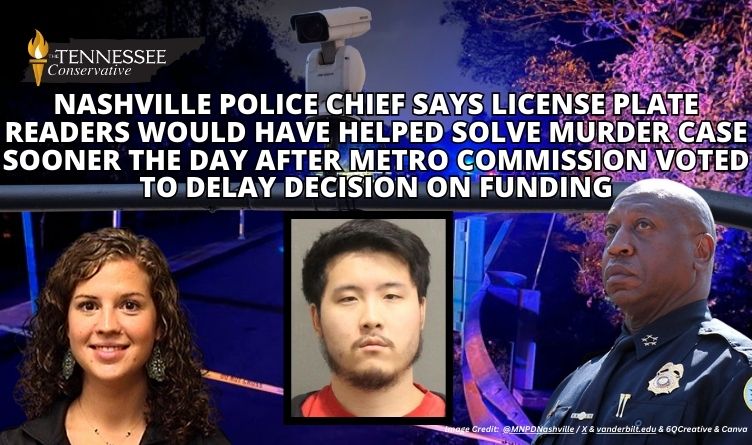Image Credit: @MNPDNashville / X , vanderbilt.edu, 6Q Creative & Canva
The Tennessee Conservative [By Paula Gomes] –
Metro Police Chief John Drake says that License Plate Readers (LPRs) would have helped solve a murder case sooner. His statements about LPRs came the day after the Metro Council voted to delay a decision on funding until November 19th.
While the Metro Nashville Police Department (MNPD) arrested 29-year-old Paul Park within 24 hours after the death of Alyssa Lokits with the help of surveillance cameras and a witness’s dashcam video, Drake said that Park lived near an intersection that was slated for LPR installation pending the Metro Council’s decision.
Drake said footage from an LPR at this location would have given MNPD information that would have been “a lot more timely.”
According to Drake, every county adjacent to Davidson County already has LPRs. Drake hopes the city will approve the cameras soon after a pilot program was carried out successfully last year. While MNPD is ready to fully implement LPRs, they are waiting for Metro Council’s approval of funding.
The Tennessee Department of Transportation (TDOT) says that there are license agreements in place all across the state already with more than 500 cameras installed. The locations of the LPRs and the agencies that operate them can be found on this department map.

The discussion surrounding LPRs in Nashville has been going on for years. Council members have had plenty of time to look into how the program works but at last week’s council meeting they decided to defer a final decision for another two meetings and schedule a public hearing.
The LPRs only collect data on license plate numbers connected to wanted criminals. Mt. Juliet Police (MJPD) have used the technology with great success since implementing a similar program called MJ Guardian Shield.
MJPD regularly updates their Facebook page with posts highlighting how the program helps officers locate stolen cars and the criminals driving them – often wanted for other crimes – within city limits. Most of the stolen vehicles come from neighboring counties, including Davidson County.
Like the LPR program being considered for Metro, the MJPD program is not enforcement based and does not access a database containing personal information. Instead, vehicles trigger an alert associated with a crime and on a hotlist that is generated from the National Crime Information Center (NCIC) database.

Critics of the proposed program in Davidson County are concerned that the cameras will use facial recognition technology and increase unwanted surveillance in the future.
The contract to connect the LPRs in Metro is with technology company Fusus. During a previous pilot program, businesses and residents voluntarily integrated their security cameras with the Fusus network. MNPD found that the combination of private and public footage increased the efficiency of dispatching officers and was also useful in collecting crime scene information.

About the Author: Paula Gomes is a Tennessee resident and reporter for The Tennessee Conservative. You can reach Paula at paula@tennesseeconservativenews.com.


